What’s the difference between magnesium glycinate vs citrate?
This is a question I’m getting a lot.
The reason I’m getting it is because so many people are bloated and constipated, and need to go to the bathroom ASAP so they assume the magnesium we have at guthealingsupplements.com is the magnesium citrate.
But, in fact, it is not.
It is magnesium bisglycinate.
Today’s post is sharing why we chose the magnesium form we did, but it’s also going to break down magnesium glycinate vs citrate.
Magnesium Glycinate vs Citrate
Click HERE to save this post for later.
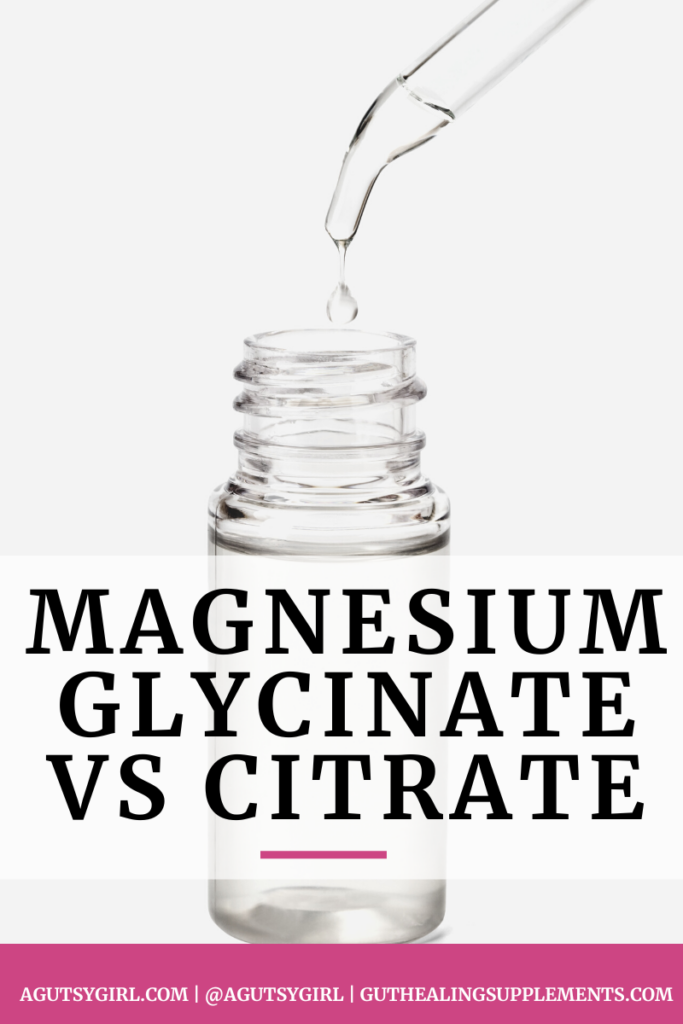
Did you ever see the Facebook post that’s made its way around the ‘net regarding one man’s description of the effect magnesium citrate had on his digestive tract?
For full context, if you have not yet seen THIS hilarious play-by-play on laxatives, you might want to give yourself the extra laugh today.
And here is why I feel as though I’m qualified to write this post…..I know exactly what he is talking about.
I’ve told the story to many people throughout my life and even told it to all of you recently again when I wrote Magnesium, Constipation, and Digestion,
Back before I started healing naturally (vs. with a random drugs and medications), on my worst days, my GI would have me drink an entire bottle of Magnesium Citrate. It didn’t matter which kind or which brand, so he’d tell me to “go to Walgreens and get this one.” Yes, an entire bottle of that nastiness.
These were for the most distended days. It was miserable, but it worked like a charm. At the time, I thought a bottle of Magnesium Citrate was my cure.
I would never drink that now.
Legit – I think I’ve done it a handful of times in my life.
So the answer is, “Yes. Yes it’s just as awful as he describes it.” Okay, maybe not as bad, but so close.
The question remains, “What is Magnesium Glycinate vs Citrate?”
Here you go….
Different Forms of Magnesium
There are many ways for magnesium supplementation, so when someone says, “just take magnesium; make sure you’re getting enough magnesium,” it’s important to recognize the different types of magnesium.
In my Master Guide of Magnesium, I break down the following:
- Magnesium Oxide
- Sulfate form of magnesium
- Magnesium Malate
- Magnesium L-Threonate
- Chlorite form of magnesium
- Gluconate magnesium
- Glycinate form of magnesium
- Magnesium Taurate
- Lactate form of magnesium
- Magnesium Oronate
- And of course, Magnesium Citrate
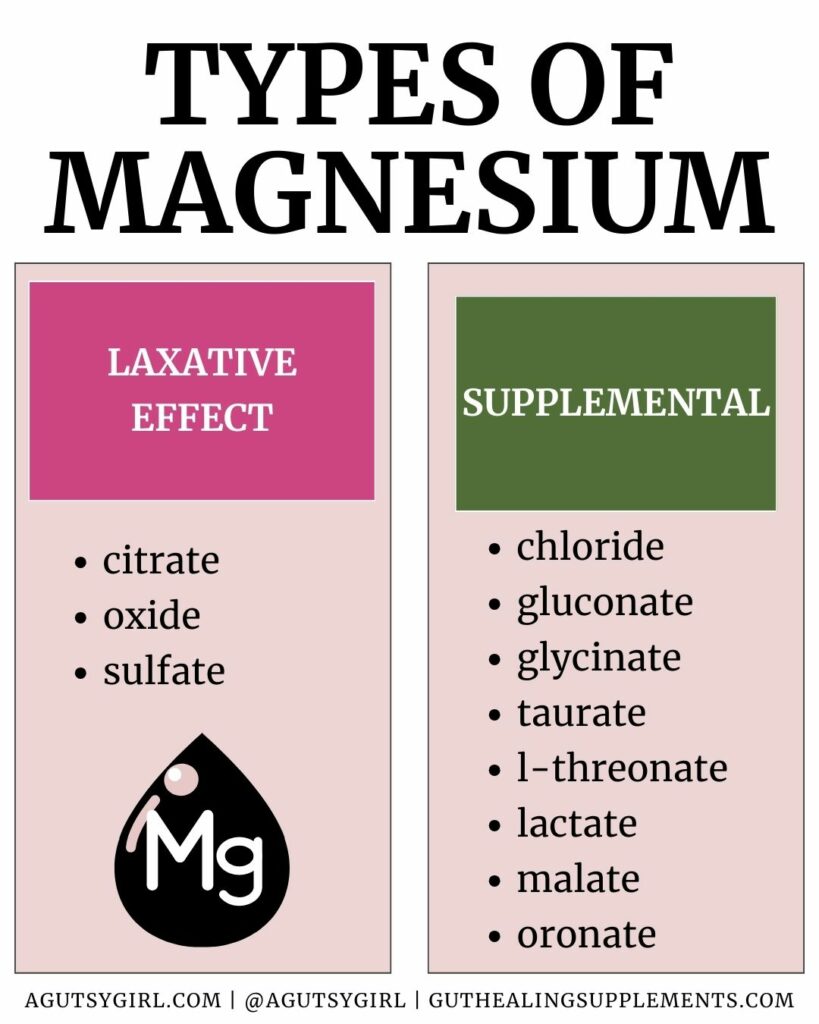
And while magnesium is a supplement, some forms have more of a laxative effect than others.
For example, high doses of it produce what the article I linked to above experience.
But nonetheless, magnesium is a critical mineral, and low magnesium levels cause issues such as:
- muscle cramps and spams
- fatigue and weakness
- irregular heartbeat
- high blood pressure
- mood changes
- sleep problems
- digestive system issues
- headaches and migraines
- numbness and tingling
In the Gutsy community, we tend to be mostly concerned with the topic of how low magnesium intake impacts the gastrointestinal tract.
And for that, we are looking towards magnesium citrate and magnesium glycinate.
What is Magnesium Citrate
Now technically your bottle might say, “Magnesium Citrate. Saline Laxative Oral Solution.”
The one I took was not dye free; his at least was. But let’s break down the ingredients contained in either/both.
Magnesium Citrate – 1.745 g (Saline Laxative)
Magnesium citrate is the generic name for over-the-counter products such as Citroma or Citrate of Magnesia, which can be used as a laxative or dietary supplement.
It belongs to group of drugs known as saline laxatives, which work by pulling more water into the colon in order to help the colon empty its contents.
Magnesium Citrate should not be confused for magnesium, though, which I have also discussed as it relates to constipation.
While Magnesium Citrate is a type of magnesium (another type is magnesium sulfate, which is what Epsom salts are!), magnesium in general is more of a supplement; the Magnesium Citrate, a laxative.
The difference is the dose.
Citric Acid
Citric Acid is naturally found in citrus fruits, but it can also be manufactured as an additive in food, cleaning agents, and nutritional supplements.
When used in a bottle of Magnesium Citrate, it is obviously manufactured.
Citric Acid is one of the most common food additives in the world and it’s used to boost acidity, enhance flavor, and preserve ingredients.
It is generally regarded as safe, but as with any additive, some people can have a reaction to it. (Note: namely those with mold sensitivities, as discussed HERE.)
Flavors
Flavors is one of the most ambiguous terms in food and product labeling. You might see it called flavors or natural flavoring.
You literally will have no clue what that means because there are thousands of combinations it could be. (This is a fact. One of the food companies I worked for in the past had a world-renowned food scientist on the team. I learned that from her.)
Purified Water
Lovely! This laxative uses water that has been filtered or processed to remove impurities like chemicals and other contaminants.
Purified water is a good thing.
Red 40
Red 40 was present in the bottle of Magnesium Citrate I used to always drink.
The U.K. has already figured this one out. They have banned it, and for good reason. It has been linked to cancer, childhood spectrum disorders, stomach issues and more.
If you want to watch a super short clip on Red 40, read Tricked by Red JELLO.
Saccharin Sodium
Saccharin is on my list of 192 Sugar Sources and Alternate Names.
It’s a non-nutritive (artificial) sweetener that’s 300-400 times sweeter than regular sugar. It’s used as both a sweetener and preservative.
Some sources say it’s perfectly fine for consumption, but organizations like the NIH have found health risks from consuming it.
Sodium Bicarbonate
Sodium Bicarbonate = NaHCO₃ = baking soda.
It is used to relieve heartburn, sour stomach, or acid indigestion by neutralizing excess stomach acid.
I’m not saying that all of the ingredients have negative effects on the human body; just recapping what’s in the store-bought magnesium citrate that many resort to.
Magnesium Citrate Warnings
Now, in case you absolutely must take a version of the magnesium citrate described above, here are the warnings (written right on the bottle):
Ask a doctor before use if you have:
- Kidney disease
- A magnesium restricted diet
- A sodium restricted diet
- Stomach pain, nausea or vomiting
- Noticed a sudden change in bowel habits that lasts more than 1 week
You can avoid that, though, by choosing the right magnesium supplement in citrate form — see below for my recommendation.
What is Magnesium Glycinate
Magnesium biglycinate is one of the most readily absorbed forms of magnesium and is so incredibly easy on the GI tract.
It aids with sleep, energy, and relaxing, and consists of magnesium bound to the amino acid glycine.
Magnesium glycinate both relaxes the muscles and can calm down your mind.
It also encourages a healthier circadian rhythm which can help you both fall asleep and stay that way.
This not only positively impacts your energy levels but can also increase your memory.



Here are some key features and benefits of magnesium glycinate:
- Absorption and Bioavailability: Magnesium glycinate is highly bioavailable, meaning it is readily absorbed and utilized by the body. The presence of glycine enhances its absorption and minimizes the potential for digestive discomfort.
- Gentle on the Stomach: Magnesium glycinate is generally well-tolerated and less likely to cause digestive issues, such as diarrhea or stomach upset, compared to other forms of magnesium.
- Calming and Relaxing Effects: Magnesium is known to have calming and relaxing properties, and glycine is an amino acid that can also promote relaxation. As a result, magnesium glycinate is often used to support a calm and balanced mood, and it may help promote quality sleep.
- Muscle Relaxation: Magnesium plays a crucial role in muscle function and relaxation. Magnesium glycinate may help alleviate muscle cramps, spasms, and tension.
- Bone Health: Magnesium is essential for maintaining healthy bones. It works synergistically with other minerals like calcium and vitamin D to support bone density and strength.
- Heart Health: Adequate magnesium levels are important for a healthy cardiovascular system. Magnesium glycinate may help support normal blood pressure, heart rhythm, and overall cardiovascular function.
- Stress Management: Magnesium is often referred to as the “anti-stress” mineral due to its involvement in stress response and the regulation of stress hormones. Magnesium glycinate may help support the body’s response to stress and promote a sense of calm.
In addition to these benefits, if you get the chelated form of magnesium glycinate, it’s an even better option.
How about the Chelated Form of Magnesium?
Chelation helps bump up the absorption value and reduces interaction with other nutrients.
Other benefits of chelated magnesium include:
- muscle and bone health
- heart health
- energy production
- blood sugar regulation + prevention of type 2 diabetes
- decreased PMS symptoms
- regulation of blood pressure
- better bowel movements
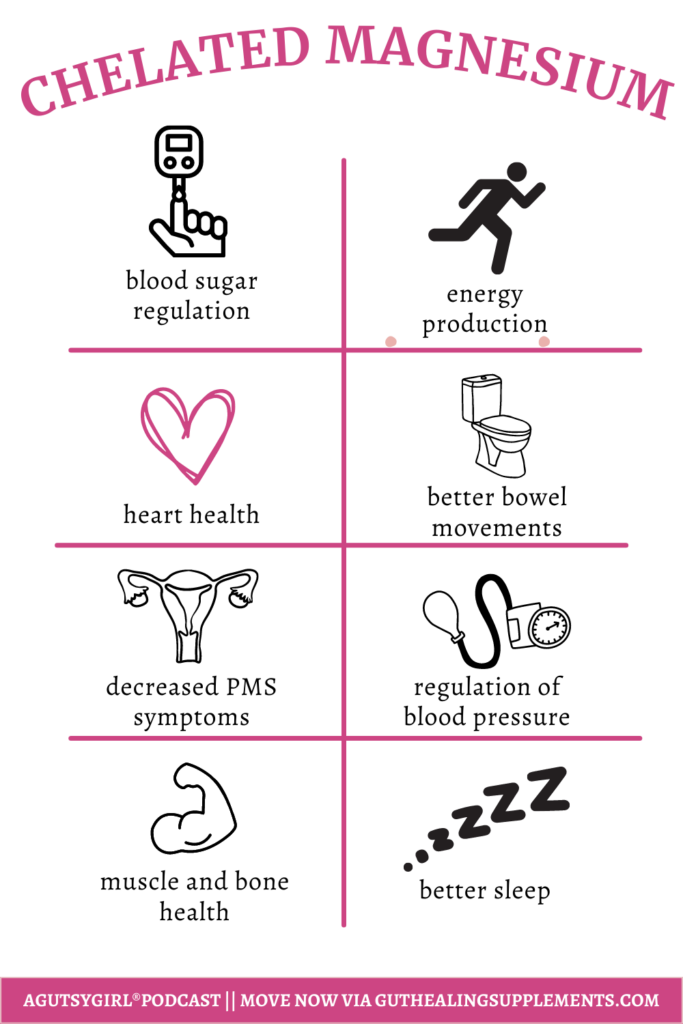
Ultimately, you should work with your healthcare provider to determine the best form of magnesium for your individual needs.
But yes, yes I’m a huge fan of magnesium glycinate — even if you are constipated and looking for a better option to move it all out!
Alternatives to Magnesium Citrate
And furthermore, if constipation is your issue, there are alternatives. And if you want to see an entire list of them, grab 15 Ways to Deal with Constipation.
However, if you’re taking it because it’s part of a Colonoscopy prep, do not substitute anything. It’s imperative that you follow the doctor’s orders prior to the procedure or they might not be able to perform it on your scheduled day.
Final Thoughts on Magnesium Citrate vs. Glycinate
Do I think you’ll die if you drink a bottle of this powerful laxative? Absolutely not. I didn’t. You won’t.
What’s important here are these 3 things:
- The account of what happens with bodily functions is pretty accurate. It’s no picnic drinking a bottle of Magnesium Citrate.
- Looking back, knowing what I know now, I would have never simply settled for just drinking a bottle of Magnesium Citrate when the GI doctor told me that was “all I needed” in order to make the severe stomach distention go away. In most cases, Magnesium Citrate is just the mask.
- If you must drink it (for Colonoscopy prep), grab the dye free one. You definitely don’t need the Red 40.
Note: Instead of the Red 40, and in order to relieve occasional constipation, opt for the Perfect Supplement Magnesium Citrate powder.
- High Bioavailability
- Lab Tested For Heavy Metals
- Virtually Tasteless and Odorless
- 100% Pure and Natural Magnesium Citrate
- Organic Form of Magnesium
- No Synthetics
- Non-GMO
- Easily Mixes Into Water or Juice
- High Solubility and Gut Absorption Rate
- Delivers 338mg of Elemental Magnesium Per Serving
- 120 Servings Per Bottle
- No Risk, 90 Day Money Back Guarantee
WHY I Chose Glycinate vs. Citrate
To wrap up, here are the exact reasons for why I chose glycinate vs. citrate:
- Glycinate falls in line with my 3rd pillar for ultimate gut healing: lifestyle. Lifestyle includes optimal sleep quality, and magnesium glycinate has this calming effect.
- Too much magnesium citrate can produce unwanted side effects like the loose stools described above.
- Not all dietary supplements are created equally. Remember, Move Now is not just about Magnesium Glycinate, but also that it’s the best magnesium supplement in the glycinate form because it’s a magnesium chelate which boasts the following benefits:
- muscle and bone health
- heart health
- energy production
- blood sugar regulation + prevention of type 2 diabetes
- decreased PMS symptoms
- regulation of blood pressure
- better bowel movements
- If you’re looking for the positive effects of more + smoother bowel movements, Glycinate is where it’s at!
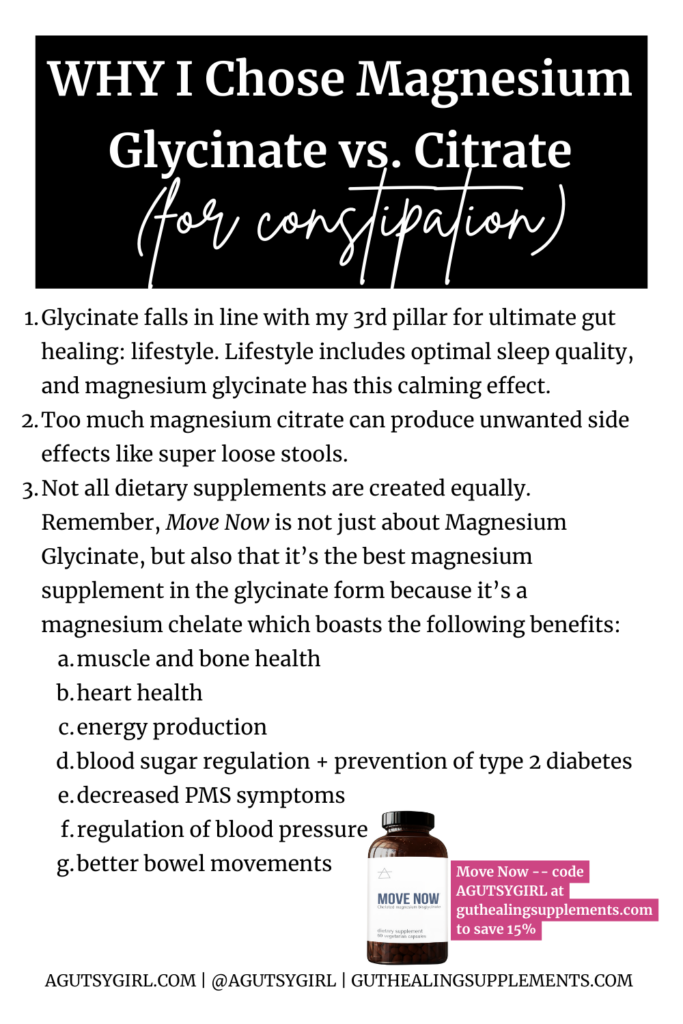
If you liked this post, you might also enjoy:
- Important Role Zinc Plays in Gut Health
- Chelated vs Non Chelated Magnesium {+ Top 5 Constipation Hacks, Episode 59, Bites #11}
- A Gutsy Girl’s supplement line
Xox,
SKH
🤰 bloating be gone! weight loss through optimal gut health for women
💃ʜᴇᴀʟ ʏᴏᴜʀ ɢᴜᴛ. ʜᴇᴀʟ ʏᴏᴜʀ ʟɪfe.
🫶🏻 founder gutbyome.com

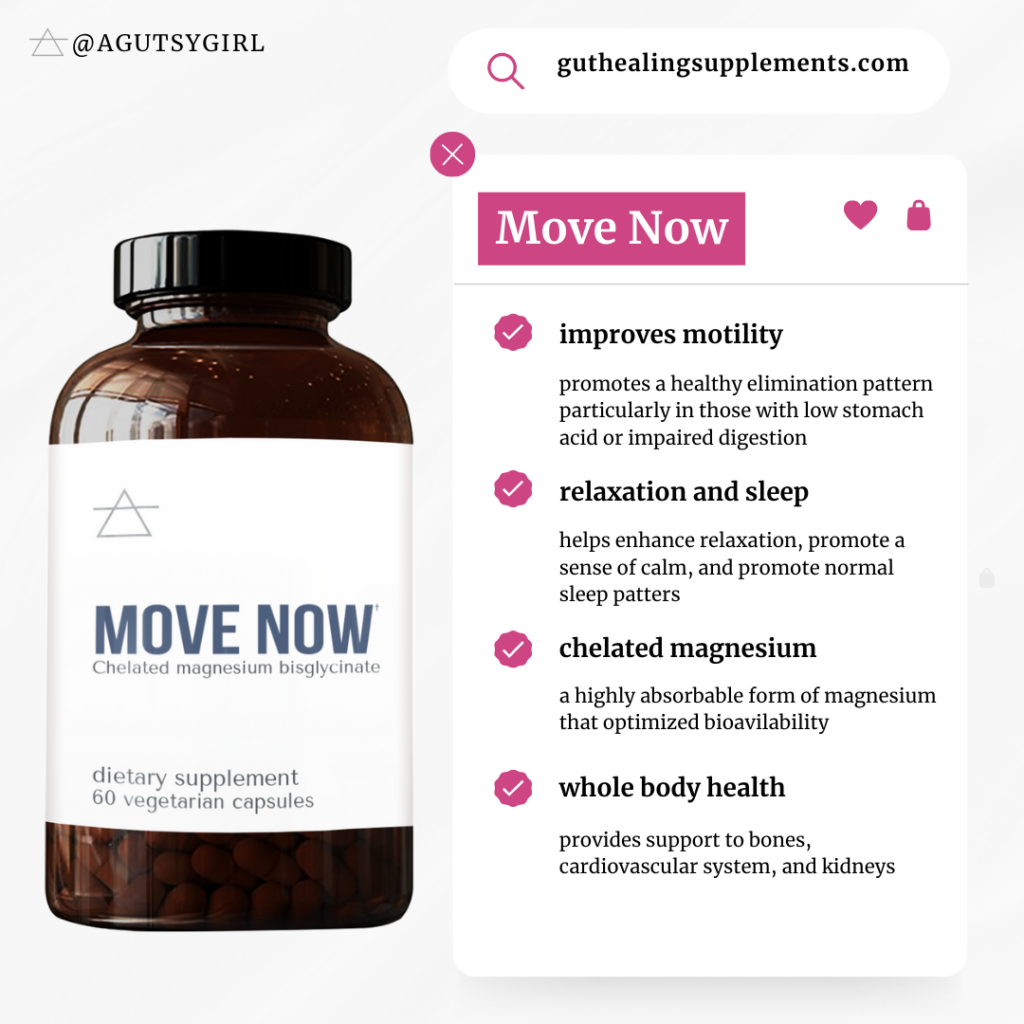
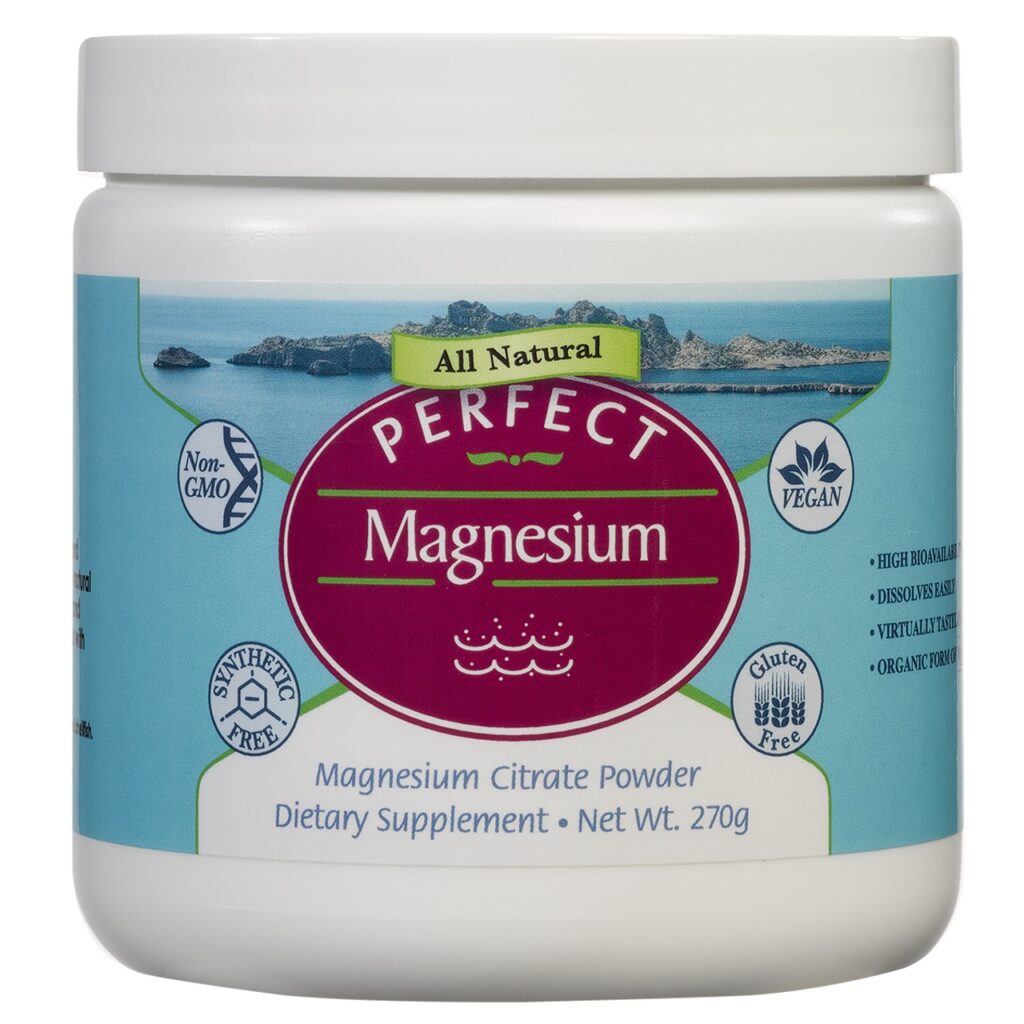



![Gut Health Podcasts [Q&A 1 with A Gutsy Girl]](https://agutsygirl.com/wp-content/uploads/2021/06/episode-11-podcast-featured-agutsygirl.com_.png)


One Comment